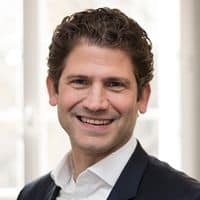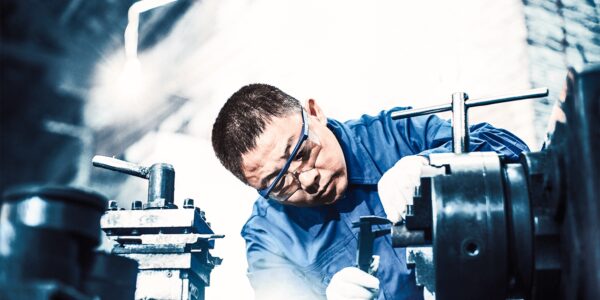
What makes companies successful in the long term? Why do we need more courage? How can companies motivate their employees in the long term? We talk about this with Marc Gassert, communication scientist and martial arts master, also known as the “blond Shaolin”.
How can companies keep their employees motivated?
Mr. Gassert, you know both the Western and the Far Eastern world well. What can the Western world learn from the Far East?
This is a complex question. In the West, in 500 B.C., there were three guys whose philosophy created models of society and ethics that are still valid and sustain our society to this day. We are talking about Socrates, Plato and Aristotle. At the same time, there were also three guys in Asia who shaped the world there with their models of thought: Confucius, Lao Tzu and Buddha. If you superimpose the teachings of these six men, you find that they are not so different.
In the East, there is more of a focus on the “we,” while in the West there is a clear focus on the “I.” In the globalized world, one can play with these models of thought and combine the good from one world with the good from the other.
What makes companies successful in the long term? How can a company become a top performer and stay that way?
A company must harness its motivations and, of course, those of its employees. In addition, it is important to practice resilience, or getting back up again, so that you keep looking forward and remain proactive in the face of setbacks or crises. The right mindset is essential here. The Japanese would say, “Ganbatte Kudasai!” meaning, “Hang in there!”
It’s fitting that you once said, “It’s not starting that’s difficult, it’s persevering.”
Companies have a great interest in their employees achieving goals. Managers have the task of explaining the goals to their employees. They must motivate employees and make the goal appealing. If the manager does his or her job well, the employees are motivated, or they motivate themselves because they like the goal, i.e., they intrinsically absorb the appeal of the goal.
Another statement you made about balance is: “For everything to stay in balance, things have to change.” Companies need to become more agile and adaptable, especially in a world characterized by volatility, uncertainty, complexity and ambiguity – the VUCA world.
Balance is not a static state, but ultimately a vibration: You have to make an effort to be in balance, like a tightrope walker standing on the rope. After all, they say, “You need vision, you need understanding, you need clarity, and you need agility.”
In my opinion, there has to be a C at the end, i.e. VUCAC. The C stands for courage, without which it is not possible. Society needs more courage factors. We are in a phase of hesitation where no one likes to make decisions anymore.
“The world belongs to the brave.” Courage is the beginning of change. How do you see the issue of courage in our managerial world, which partly thrives on not making mistakes?
Error prevention is a widespread and also incredibly smart strategy. In China, people often use the phrase “Don’t be overconfident, don’t put yourself in danger” or “The second mouse gets the cheese.”
But I would argue the other way around: Where do you learn the most? From mistakes! We also need innovations. The people or companies that are the first to produce an innovation are more visible. Even when they make mistakes in the process.
What drives us as humans? How do we get more out of ourselves and stay motivated?
Intrinsic motivation is the most sustainable driving force a person can generate. This is also exciting for companies, as they have to constantly drive and motivate their employees. However, if employees are intrinsically motivated, this may not be necessary.
There are different forms of intrinsic motivation.
The first form is praise. Some people just want to be praised. Sometimes even before they start a task. It motivates them to get started in the first place.
For others, praise does not do much. It can even make them feel insecure. These people are more in need of clarity.
The third group needs competition. For example, these employees strive to always achieve one more deal than their colleagues.
However, a large company cannot stimulate the right trigger points for each individual employee. Here, other intrinsic motivators are needed.
What can companies do to motivate their employees?
I recommend companies reflect on the three types of motivation and use them strategically.
The first motivator is the biology and biochemistry of the body. A simple example is to build pressure and create stress because stress turns into performance. But: The more stress hormones in the body, the less solution-oriented thinking is possible.
On the biochemical level, however, not only can stress hormones be released, but also happiness hormones, e.g., when employees are praised or receive incentives. Employees want more and more of this feeling of happiness and thereby become high-performers.
The second motivator is on the value level. Ideally, corporate values are congruent with the individual values of the employees.
The third form of intrinsic motivation is the sheer willpower of an individual. Many things that have to be done are not done for biological or honorable reasons, but simply because they have to be done.
You are a strong follower of Taoism, which focuses on making the world a little bit better all the time. How do you currently assess developments in Europe? Are we on a good path to making the world a better place?
I recently had a conversation with the Greek ex-minister Yanis Varoufakis. He is concerned about the current situation in Europe because the centrifugal forces are so great that they are virtually driving Europe apart. I, too, see a trend toward nationalism that I don’t like. That’s when I sometimes think, in the words of Ronja, the Robber’s Daughter, “Oh God, I hope the world doesn’t go to the dogs.”
Taoists like to widen their view. On the one hand, they observe how the individual is doing, but also how society is doing, and finally how nature is doing. I believe that many people and companies are increasingly embracing these different perspectives. Accordingly, our gaze is polarized regarding the climate crisis or even the limits of economic activity as they are at the moment.
Some processes coming our way are incredibly exciting – they will drive us forward as a society and change the world.
Host

Dr. Thilo Greshake, Partner Automotive, STAUFEN.AG
With a doctorate in mechanical engineering and more than 15 years of international consulting experience in lean development, engineering excellence and quality management, Dr. Thilo Greshake has been responsible for the Automotive division at Staufen AG since 2017.
Gast

Marc Gassert, Kommunikationswissenschaftler und Kampfkunstmeister
Marc Gassert is a speaker and a welcome guest at top events. He is known around the country as the “blond Shaolin” and offers lively lectures on transferring knowledge between Far Eastern and Western culture. Marc Gassert first studied communication sciences and intercultural communication in Munich and later Japanese studies in Tokyo. He speaks six languages and has various master’s degrees in Karate, Taekwondo and Shaolin Kung-Fu.
Experience Marc Gassert live at the BestPractice Day 2021.



